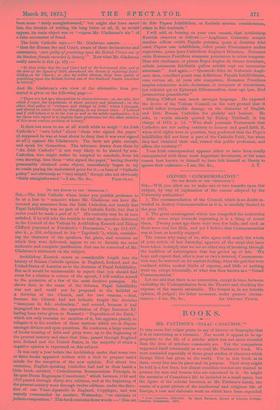(TO THE EDITOR OF THE " SPECTATOR:1 :Sut,—The Irish Catholic
whose letter you publish professes to be at a loss to "conceive where Mr. Gladstone can have dis- covered any assurance from the Irish Catholics, not merely that Papal Infallibility was no part of the Catholic Faith, but that it never could be made a part of it." His curiosity may be at once satisfied, if he will take the trouble to read the speeches delivered in the Council of the Vatican by Archbishop Kenrick and Bishop 'Clifford (reported in Friedrich's "Documents," i., pp. 212-219; also ii., p. 258, subjoined to his " Tagebuch "), which, consider- ing the character of the speakers, the place, and occasion on which they were delivered, appear to me to furnish the most authentic and complete justification that can be conceived of Mr. -Gladstone's statement on the subject.
Archbishop Kenrick enters at considerable length into the history of Roman Catholic opinion in England, Ireland, and the United States of America as to the doctrine of Papal Infallibility. But as it would be unreasonable to expect that you should find room for a citation in extenso of the speech, I will confine myself -to the quotation of a few of the most decisive passages. He shows that, in the sense of the Schema, Papal Infallibility was not and could not be proposed to the faithful as a doctrine of the Church, and for two reasons, —first, because the Church had not hitherto taught the doctrine 4qamquam de fide credendam ;" and second, because it had impugned the doctrine, the approbation of Pope Innocent XL having been twice given to Bossuet's "Exposition of the Faith," which not only contains no mention of it, but appears plainly to relegate it to the number of those matters which are in dispute amongst divines and open questions. He continues, a large number of books treating of faith and piety were, up to the beginning of the present century and since that time, passed through England into Ireland and the United States, in the majority of which a negative opinion is expressed on this subject.
It was only a year before the Archbishop spoke that some two or three books appeared written with a view to prepare men's minds for the reception of the new opinion. For about two centuries, English-speaking Catholics had had in their hands a little book, entitled, " Catholicorum Romanensimn Principle, in Ifs quEe Deem Regemque Concernunt," which between 1748 and 1813 passed through thirty-five editions, and at the beginning of the present century went through twelve editions, under the direc- tion of one Vicar-Apostolic in England, Coppinger, and was warmly commended by another, Walmesley, " ut claritate et judicio compositum." This book contains these words :—" Non est de fide Papam Infallibilem, at Ecclesid seorsim consideratum, etiam in fide tradenda."
I will add, as bearing on your own remark, that Archbishop Kenrick observes as follows :—" Anglican° Gubernio semper maxime odiosa extitit Papalis potestas, quam si doctrine fidei esset, Papam ease infallibilem, videri posait Proteatantea melius cognovisse, quam ipsos Catholicos Angina et Hibernos. Noverant enim Romanos Pontifiees summam potestatem in rebus tempora- libus sibi vindicasse, et plume Reges Anglos de throno deturbare, solutis juramenta fidelitatis quibus subditi ergh eoa tenerentur attentasse." And again,—" Quomodo fides sic Gubernio Angli- cano data, conciliaii posait cum definitione Papalis Infallibilitatis, cum certum sit, id juxis sibi eompetere, Romanos Pontifical saepius solemniore modo deelarasse, et nunquam ei renuntiasse, ipsi viderint qui ex Episcopis Hibernensibus, slant ego ipse, illud jummentum praestiterint "
Bishop Clifford uses much stronger language. He opposed the decree of the Vatican Council, on the very ground that it would inflict irreparable damage on the character of English and Irish Roman Catholics for probity and honour. He asks, in words already quoted by Bishop Thirlwall, in his charge of 1872, p. 12, "Who shall persuade Protestants that Catholics are not acting contrary to honour and good faith, if, when civil rights were in question, they professed that the Pope's infallibility did not form a part of the Catholic Faith, but when they had obtained their end, retract this public profession, and affirm the contrary?"
Your Irish correspondent appears either to have been totally unacquainted with these most important documents, or for some reason best known to himself to have felt himself at liberty to ignore their existence.—I am, Sir, &c., J. T.


































 Previous page
Previous page